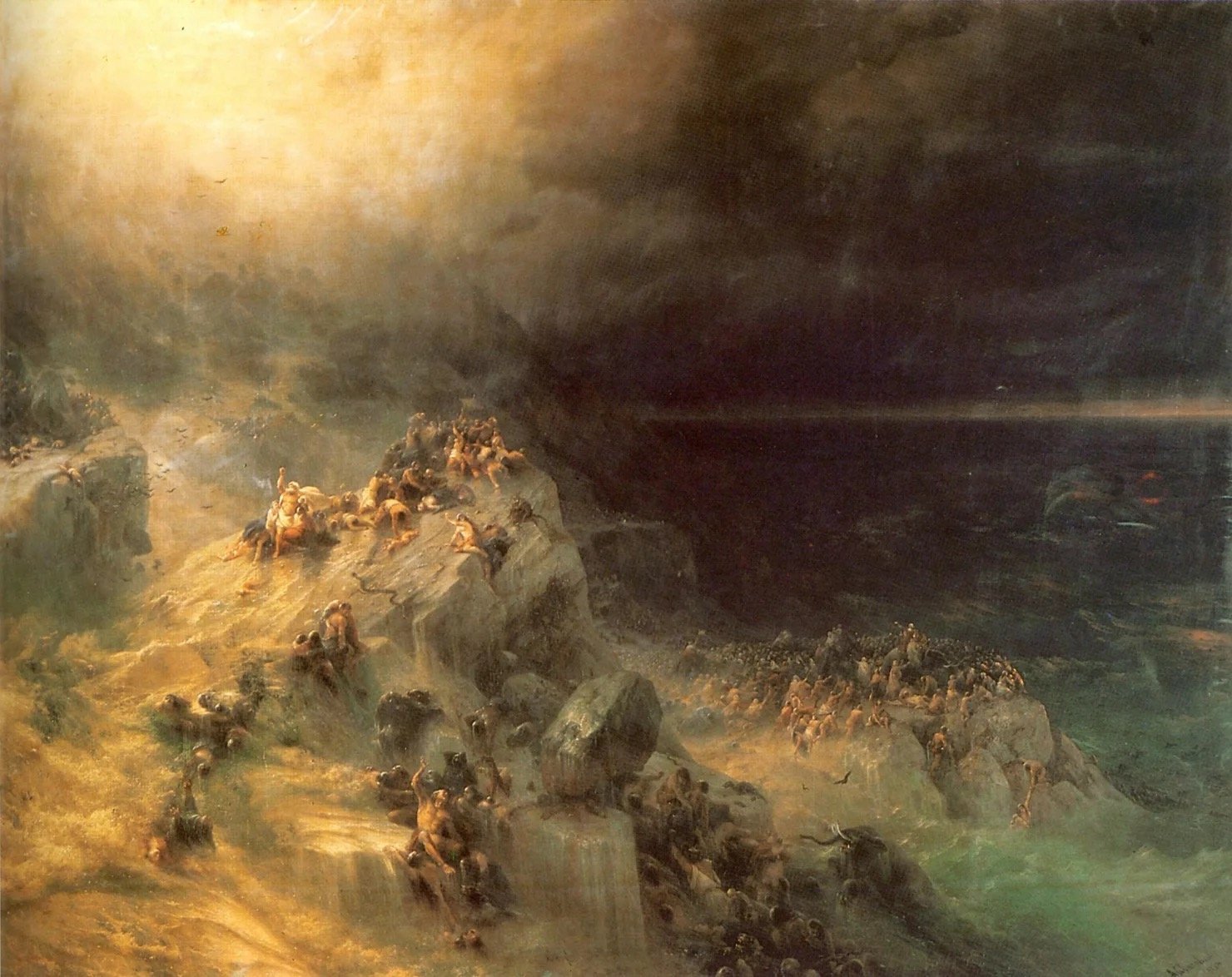The Story of Noah
In the 19th century, the Russian painter Ivan Aivazovsky depicted the horrific scene of the worldwide flood in Genesis:
In this story, God is angry at humanity because **checks notes** divine beings known as the sons of God descended from heaven and started marrying the beautiful women of the earth. Rather than punishing the eternal sons of God, God becomes enraged with the ephemeral human beings. The rage is so palpable that God regrets creating humanity in the first place, and so God decides that the only way to rectify the situation is to send a worldwide flood that will wipe out everyone.
Well... not everyone. Because Noah (and his family) find favor in the eyes of God.
So God tells Noah about the impending doom and instructs him to build a boat.
Noah builds it, and hordes of animals show up to inhabit the boat.
Then God sends the flood.
Everyone dies.
But Noah and his family live.
After the flood, the family and the surviving animals walk out into the barren wasteland that is earth, and offer a sacrifice of praise to God for saving them from God.
And then God places a rainbow in the sky and promises never to destroy the world again with a global flood.
My friends, this is a disturbing story.
God kills a lot of people for reasons that are murky at best.
So as people who are interested in following God and also participating in religion today,
the question needs to be asked,
"What on earth do we do with this disturbing story?
Here are a few thoughts that I hope can help you answer this question:
The story of Noah is NOT a children's story--Between the sexual intercourse of divine beings with humans AND the worldwide genocide, it's time for us to admit that this is one of those stories that is best left for when children become teenagers or adults.
In the Bible, there are stories that happened and stories that did not happen... in a near unanimous voice, modern science tells us that this story did not happen--If the worldwide flood literally and historically occurred, then geologists across the globe would be coming to the same conclusion regardless of their religious affiliation. I have found that the only geologists who can provide "evidence" for a worldwide flood, are those who use the Bible as a starting point for their scientific data (which is poor science).
A story's value does not depend on whether or not it historically occurred--One of the most valuable stories in all of scripture is the parable of the Prodigal Son, which is a fictional story told to us by Jesus of Nazareth.
When we ask, "What kind of god would kill almost all of humanity with a worldwide flood?", it's a far more interesting question then, "Did the story of Noah and the flood literally and historically occur?"--The reason why is because it's a question about the character of God. The God I know would NEVER act like the god in Genesis 6-9.
This story came from a group of ancient people who survived a flood, and then later interpreted that flood as the result of God's anger with them--This is not a surprise, because if I lived through a flood that destroyed my village, I would (most likely) interpret it the same way. Additionally, there were no cell phones to call other villages and see if they were experiencing a flood at the same time, which means it felt like their whole world was flooding.
Several Christians believe this story is true. They are not bad people--Anytime we believe that someone has to believe the same things we do in order to be considered, "Good," we are treading on dangerous ground.
Noah did not preach outside the ark to invite others to repent and join his family on the ark--This part of the story is not found in the Bible. It was added later by Christians to help them feel less compassion for those that God killed in the flood, and to feel that God was, in fact, more just.
Unhealthy religion will lead you to believe that you do not need to feel compassion for those who deserve their suffering. But healthy religion will always lead you to become a more empathetic person--Even if people deserve their suffering, we are still called to love and care for them. The idea that we stop caring about them once they deserve to be punished is antithetical to the Christian message.
As adults, we create arks all the time--We love to create political parties, religious tribes, educational barriers, and economic insulators that separate us from them. And then we judge those who are outside of our ark.
If we are serious about following Jesus, then we must be more concerned with the people outside of our ark, than we are with being in the "correct" ark--Jesus taught that all of the law and the prophets could be hung on the fact that we are to love God and love our neighbor. Following Jesus requires us to find unity, kindness, and love fo the people who are outside of our boat.
If you'd like to explore these ideas further, you can watch this sermon here.

